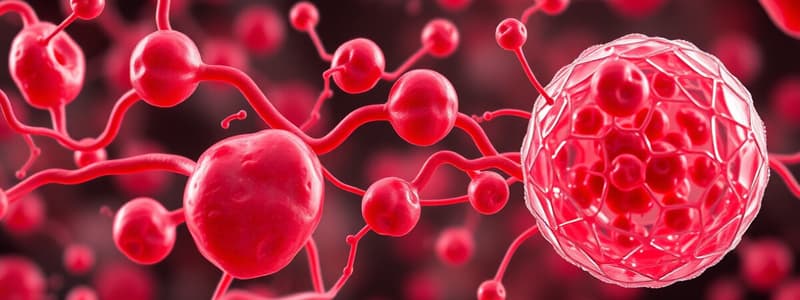Podcast
Questions and Answers
Where does hematopoiesis primarily occur during postnatal life?
Where does hematopoiesis primarily occur during postnatal life?
- Red bone marrow (correct)
- Yolk sac
- Liver
- Spleen
What is a primary function of blood in the cardiovascular system?
What is a primary function of blood in the cardiovascular system?
- Transport of gases such as oxygen and carbon dioxide (correct)
- Protection against external injuries
- Storage of nutrients for later use
- Regulation of body temperature exclusively through sweat
Which hormone stimulates the formation of red blood cells from proerythroblasts?
Which hormone stimulates the formation of red blood cells from proerythroblasts?
- Erythropoietin (EPO) (correct)
- Anemia factor
- Leukopoietin
- Thrombopoietin (TPO)
What types of white blood cells are produced from myeloblasts?
What types of white blood cells are produced from myeloblasts?
Which of the following does NOT describe a function of blood?
Which of the following does NOT describe a function of blood?
What initiates the differentiation of hemopoietic stem cells into various blood corpuscles?
What initiates the differentiation of hemopoietic stem cells into various blood corpuscles?
What is the role of thrombopoietin (TPO) in blood cell production?
What is the role of thrombopoietin (TPO) in blood cell production?
In which organ is erythropoietin primarily produced?
In which organ is erythropoietin primarily produced?
During which stage of development does hematopoiesis first begin?
During which stage of development does hematopoiesis first begin?
What happens to the liver and spleen in cases of severe blood loss, such as in anemia?
What happens to the liver and spleen in cases of severe blood loss, such as in anemia?
Flashcards are hidden until you start studying
Study Notes
Blood Functions
- Blood serves as the body's transportation system, carrying oxygen, nutrients, waste products, enzymes, hormones, and heat.
- It plays a crucial role in maintaining temperature regulation, pH balance, electrolyte balance, and water balance.
- Blood also protects the body against pathogens as part of the immune system and participates in clot formation.
### Formed Elements / Corpuscles
- Formed elements, or corpuscles, are the cellular components of blood and are produced through hematopoiesis, also known as hemopoiesis.
- This process starts in the yolk sac during embryonic development, then shifts to the liver and spleen, and finally to the red bone marrow.
- After birth, red bone marrow remains the primary site of corpuscle production.
- The liver and spleen can resume corpuscle production if levels are severely depleted, for example, during anemia or leukemia.
Origin of Blood Corpuscles
- All blood corpuscles originate from hemopoietic stem cells, known as hemocytoblasts.
- These stem cells differentiate into various types of corpuscles:
- Erythrocytes (red blood cells): Proerythroblasts develop into mature red blood cells.
- Granular white blood cells: Myeloblasts give rise to basophils, eosinophils, and neutrophils.
- Agranular white blood cells: Lymphoblasts differentiate into lymphocytes, and monoblasts develop into monocytes.
- Platelets: Megakaryoblasts form megakaryocytes, which fragment into platelets.
Regulation of Hemopoiesis
- Erythropoietin (EPO), produced and released by the kidneys, stimulates the development of proerythroblasts into red blood cells.
- Thrombopoietin (TPO), produced and released by the liver, stimulates the development of megakaryoblasts into platelets.
Clinical Use
- EPO is used to treat patients with kidney failure and those undergoing chemotherapy, as it helps boost red blood cell production.
- TPO is used for patients undergoing chemotherapy to aid in platelet production.
Studying That Suits You
Use AI to generate personalized quizzes and flashcards to suit your learning preferences.




